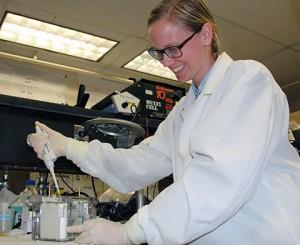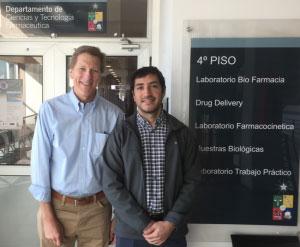Learn More About Our Program
Eligibility and Admissions
Applicants should have a baccalaureate degree in a discipline such as pharmacy, chemistry, biochemistry or a biological science. This training should include coursework in each of the following: one year each of physical chemistry, organic chemistry, a biological or pharmaceutical science and calculus.
Additional details about eligibility and admissions can be found on the Research & Graduate Studies site.

Ph.D. Graduate Program
Degree Details
Degree Requirements
Graduate degrees are awarded for the student’s demonstration of mastery of a selected field and independent scholarship therein. The program of study is tailored to best suit each student’s interests and professional goals while maintaining the standards established by the student’s supervisory committee and the division. Each student is required to select at least 18 hours from a list of “core” courses in pharmaceutics, physical chemistry, general chemistry, mathematics and statistics. Additional coursework is encouraged.
Progression
Following completion of the core course requirements, the student takes a written candidacy examination authored by all members of the student’s examining committee. Typically, the examining committee consists of the same members as the supervisory committee. The student also submits to the supervisory committee a written proposal describing the proposed dissertation/thesis research and then presents the proposal in an oral proposal defense.
The core course requirements, the written candidacy examination, the written research proposal, and the oral proposal defense constitute the Ph.D. candidacy requirements within the Molecular Pharmaceutics and Drug Delivery Division. The degree requirements include the candidacy requirements plus preparation and oral defense of a dissertation (Ph.D.) based upon original research. Successful completion of the Ph.D. candidacy requirements must be accomplished at least one year prior to the date of the dissertation defense.
Required Curriculum
The following is a summary of the required curriculum. For a detailed curriculum and additional requirements, please visit the Molecular Pharmaceutics and Drug Delivery handbook.
Pharmaceutics Ph.D. Candidacy Requirements for Graduate Students
Note: satisfactory completion of at least one course in each of the four non-Pharmaceutics core areas is required.
Pharmaceutics Core Courses
- PHR180J Advanced Pharmaceutics Lab Problems
- PHR190H Advanced Pharmaceutics Research Conference
- PHR280J Advanced Pharmaceutics Lab Problems
- PHR380J Advanced Pharmaceutics Lab Problems
- PHR380M Drug Development PHR380Q Advanced Pharmaceutical Processing
- PHR381D Product Development
- PHR381G Advanced Manufacturing Pharmacy
- PHR382R Recent Advances in Pharmaceutics
- PHR382V Pharmaceutical Biotechnology
- PHR383N Solution Theory and Disperse Systems
- PHR383P Advanced Pharmacokinetics
- PHR383Q Statistics in Translational Science
- PHR383R Rate Process in Pharmaceutical Systems
- PHR386Q Preclinical and Clinical Drug Development
- PHR487Q Communication Skills for Scientists
Non-Pharmaceutics Core Areas
Upper Division Courses in Statistics
- EDP371 Introduction to Statistics
- EDP380E 1 Fundamentals of Statistics
- M378K Introduction to Mathematical Statistics
- M384F Design of Experiments UT-Austin Mathematics courses at or above Calculus
Mathematics Courses at or Above Calculus II
- M427K Advanced Calculus I
- M427L Advanced Calculus for Applications II
- M368K Numerical Mathematics
Physical Chemistry Courses at or Above CH353 Level
- CH353M Physical Chemistry I for Life Sciences
- CH354 Quantum Chemistry and Spectroscopy
- CH392N Physical Chemistry of Macromolecular Systems
Graduate-level Courses in Chemistry or Chemical Engineering and Biomedical Engineering
- BME382J 6 Biopolymers and Drug/Gene Delivery
- BME 382J Advanced Engineering Biomaterials
- BME387J Topics in Biomedical Engineering
- CHE384K Applied Kinetics and Chemical Reaction Analysis
- CHE392 Polymer Science
- CHE395J Product and Process Development
- CH381M Advanced Analytical Chemistry
- CH386J Advanced Organic Chemistry
Career Opportunities
Short-term post-doctoral positions are available to pharmaceutics graduates but are not routinely pursued as in many other disciplines. Graduates from our program typically progress directly to permanent positions in academia as well as pharmaceutical industry and regulatory agencies such as the Food and Drug Administration.
Spotlight on Success

The Division of Molecular Pharmaceutics and Drug Delivery is proud to recognize the accomplishments of one of our recent graduates, Javier O. Morales, Ph.D. (2012; McConville/Williams).
Dr. Morales recently hosted two graduate student workshops at the University of Chile titled “Formulating Poorly Water Soluble Drugs” and “Publishing Strategies for Pharmaceutical Scientists.” He is an Assistant Professor in the Department of Pharmaceutical Science and Technology at the School of Chemical and Pharmaceutical Sciences of the University of Chile and an Associate Researcher in the Advanced Center for Chronic Diseases (ACCDiS).
Dr. Morales received his Bachelor of Science in Pharmacy (2006) and a Professional Degree in Pharmacy (2007) at the University of Chile; and his Ph.D. from The University of Texas at Austin (2012), after which he joined the faculty at the University of Chile (2013).

